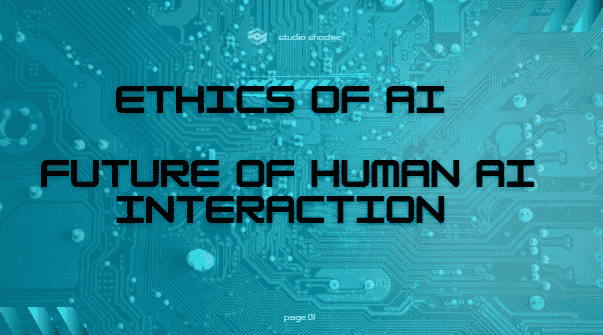Ethics of AI: Future of Human-AI Interaction

It is essential to use anything ethically, whether a product or service, especially if it grows rapidly. Ethics in AI also guarantee that artificial intelligence is used relatively. Following these ethics is very important for AI. In this article, I’ll discuss the Ethics of AI in detail, and I hope it will help you gain knowledge about its fair use.
What Is The Ethics Of AI?
Various resources, like AI Office, provide AI ethical principles information to ensure safe and responsible use of AI technologies.
The secure application and operation of AI must ensure people’s safety and environmental protection. Business organizations establish internal ethical principles, while national governments establish framework regulations for AI usage.
In today’s tech industry, special divisions within major companies such as IBM, Google, and Meta focus on ethics arising from their data collection practices, which is vital for AI Office and similar technologies.
10 Key Requirements for Trustworthy AI Systems: AI Ethics
1. Human Control
AI should not wholly control everything; instead, it should include human choices. Certain decisions, especially those intended for humans, should also be under human control. It helps AI to protect human rights.
2. Robustness & Safety
Security must be the highest priority. AI systems should have backup plans ready to activate if any data is lost. AI needs to be reliable and secure, ensuring that human data remains protected and safe.
3. The Governance of Data and Privacy
Protecting human privacy is an essential requirement for AI system usage. The correct protection rules support proper data handling and the security of personal information. Users remain protected from unauthorized access by complete data accuracy controls alongside limited recipient authorization.
4. Clear
AI systems must develop precise capabilities that reveal their operations to users. AI systems require users to identify when artificial intelligence applies through clear indications while receiving full awareness of operating boundaries and functional limitations. The delivery of explanations builds trust while helping users manage their technological knowledge interactions.
5. Diversity & Fairness
Artificial intelligence systems must operate without causing harm through biased processes that discriminate against specific population segments. The systems need to remain accessible for all users, including those who have any form of disability. Getting wide-ranging stakeholder participation in AI development establishes conditions for fair solution production.
6. Social Friendly
It should be socially friendly, which means it should also be designed to benefit the next generation. The developer should remember that the environment should be pleasant so that benefits can be continuously derived from it, not just currently.
7. Accountability
AI systems & their outcomes should have clear rules about who is responsible. It includes the processes regarding checking exactly how the system was built and the operation process. You want users to have ways to get help or receive compensation in case a problem arises.
8. Education and Empowerment of Users
Users need to know what AI can & can’t do. Understanding how AI works helps users make better decisions about when and how to use it, which improves their safety with technology.
9. Interdisciplinary Collaboration
To realize ethical AI, it must cooperate with professionals from different disciplines, like technology, law, sociology, and ethics. By obtaining different perspectives together, developers can understand the effect of AI on society and create a way to help everyone.
10. Ongoing Education and Development
AI systems should learn from their experience & user feedback over time. It builds on that ongoing improvement to ensure that technology keeps being valuable to users’ needs as they change.
Which People Play A Role In AI Ethics
AI Creators & Scientists
The people who create AI try to make AI according to all fair policies (AI ethics). They keep AI human-friendly to understand humans better.
Govt & Rule Makers
Govt rules and laws that make sure that AI is within boundaries. It makes sure the fair use of AI to protect human rights.
Business Leader
Business leaders who use their AI ensure that the AI they use in their company is environment-friendly and will not harm society. They set ethical boundaries with their business.
Public
Public interest groups observe the use of AI and raise concerns when issues arise. They defend communities that AI systems may affect & work toward fair treatment.
Universities and Researchers
Universities & research centers educate future AI developers, examine AI’s societal impacts, and help establish guidelines for responsible AI usage.
Daily Users
Everyday users and regular individuals who engage with AI—whether on their phones, at work, or through public services—play an important role in advocating for AI systems that are fair, transparent, and beneficial in daily life.
Ethical Concerns To AI
1. Wrong Or Unclear Actions
AI sometimes performs actions that are not entirely clear, which causes wrong consequences. Many people suffer because of AI’s unclear information, especially those who depend on AI.
2. Hidden Working
Users are unaware of the hidden workings of many AI tools, such as Black Box. For example, if you are not sure how AI creates cookies, you would not be confident using it or sharing your information.
3. Unequal Treatment
AI should treat every person according to age and gender, & if we want the same request from AI, we may face challenges here. One of the main problem is the unfair treatment.
4. Human Control
We need to ensure that humans have the final say in more decisions that we see AI making. People should always have the final say in decisions that have the potential to alter their lives.
5. Data Protection
Personal information is necessary for AI to work well. However, we worry that this information will not be safe & that people and groups will be unable to control what happens with their data.
6. Who’s Responsible
In any security issue case, there is not always someone at fault: it can be the developer, the user, or the owner. There’s no other way to learn—except through struggle—than clear guidance on who was wrong when things go wrong.
7. Too Much Trust
It can sometimes be convenient to allow AI to operate without question, assuming it will provide accurate answers. However, depending on AI & trusting in the AI’s decisions can lead to significant issues if users do not verify whether those decisions are logical or correct.
8. Staying Safe
AI systems must be built (at least) safely & able to solve problems without causing harm. They should also work correctly when something unexpected occurs or someone tries to abuse them.
Bottom Line
AI is becoming a big part of our everyday lives & many different businesses, especially today. To use AI responsibly, we must adhere to important ethical guidelines
This article will help you see how we can use AI responsibly; it improves human and AI interaction. As we move forward, AI has the potential to bring us even more advantages. If the people who create AI focus on ethical practices, we can look forward to a safer & more secure future by 2025.





